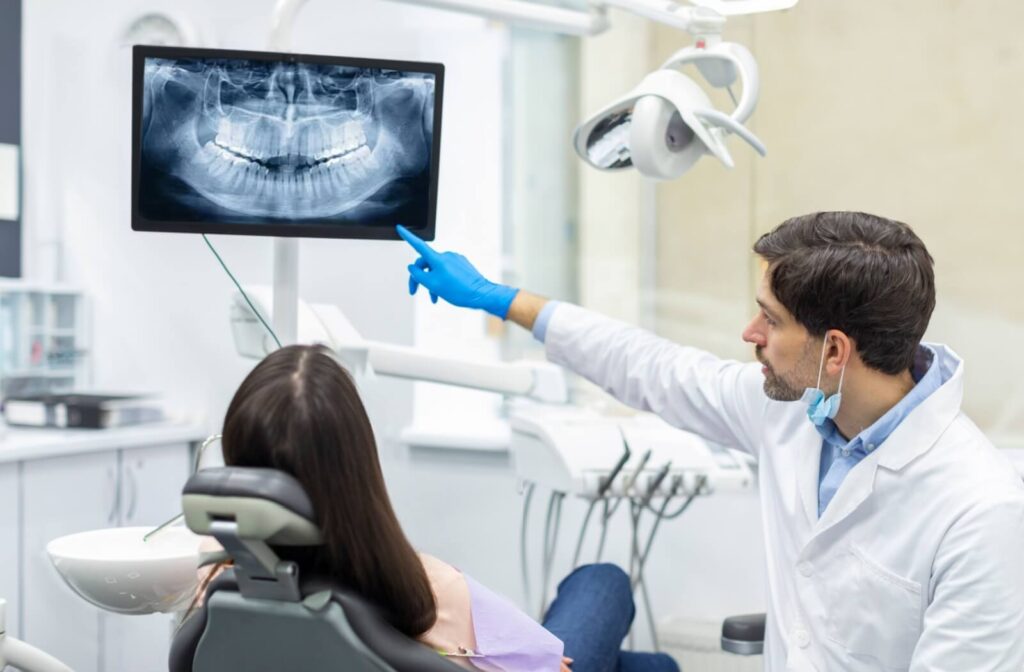
Many of us know that regular dental check-ups and getting our teeth cleaned are essential. What is often less clear is how often dental check-ups are needed. While everyone’s oral health is different, most experts recommend visiting the dentist about twice a year.
However, this may vary depending on a person’s circumstances and how susceptible they are to cavities and tooth decay. In some cases, a dentist may suggest that a patient visit more frequently.
Why Regular Visits to the Dentist Are Important
In general, the Canadian Dental Association (CDA) recommends visiting the dentist every six months. The purpose of these appointments is to identify problems as early as possible.
However, some people require more or less frequent check-ups, depending on the health of their teeth and gums. We’re all different!
Regular dental check-ups do more than treat existing dental issues. They can help you avoid expensive or uncomfortable procedures down the road. For example, if tooth decay is caught early, it can be reversed before it becomes a cavity that needs to be filled.
Factors That Influence How Often You Should Visit the Dentist
The twice-a-year rule advised by the CDA is just a general recommendation. In reality, the frequency with which you should visit your dentist depends on a variety of factors:
- Hygiene habits: The CDA recommends brushing your teeth for 2-3 minutes twice a day and flossing at least once a day. Toothbrushes should be replaced every 3 months.
- Diet: According to the FDI World Dental Federation, sugar is the main driver of tooth decay. How much and how often someone eats sugar are important factors in causing tooth decay.
- Tobacco use: The Centers for Disease Control (CDC) suggests that 40% of smoking adults aged 20-64 have cavities, while only 20% of adults who have never smoked do. So, there’s a significant association between tobacco use and oral health.
- Alcohol use: Alcohol can also affect oral health. In fact, there’s a link between harmful alcohol consumption and cancers of the mouth and throat.
- Other health conditions: There’s a strong relationship between oral health and general health. Conditions that may influence your oral health—and by extension, how often you need to visit the dentist!—include osteoporosis, Paget’s disease, stress, and anxiety. Make sure you tell your dentist about the medications you take because some medications can affect your dental health and treatment as well.
What Happens During a Dentist Appointment
This can vary depending on the individual dentist and your specific needs.
General Physical Exam to Check for Problems
A dentist appointment usually starts with a physical exam. Here, the dentist will check for signs of problems like gum disease, cavities, improperly positioned teeth, oral cancers, and other potential problems.
Professional Cleaning By a Dental Hygienist
A professional cleaning of your teeth is typically done by a dental hygienist. How well you care for your teeth can impact how much cleaning your hygienist has to do.
Usually, the hygienist starts by removing plaque and tartar from your teeth and around your gums. Typically, after that, they’ll polish your teeth. The toothpaste used in this process is specialized and may feel a bit gritty.
Do I Need X-Rays At Every Dentist Appointment?

Dental X-rays aren’t always required for every dental check-up. However, if you have dental fillings or possible tooth decay hidden beneath your gum line, your dentist might suggest getting an X-ray. Issues that an X-ray can detect include cavities under fillings, bone loss, fractures, or problematic wisdom teeth.
What to Discuss During a Dentist Appointment
Your dental appointment is your time to ask your dentist any questions or to explain any concerns. The CDA recommends discussing the following topics with your dentist:
- New things you’ve noticed about your teeth, gums, and mouth. For instance, tell your dentist if you notice a change in the positioning or colour of teeth, or loose teeth. They should also know about changes in your gums or if you notice bleeding when you brush or floss. Skin colour changes inside the mouth should be mentioned, too. Finally, tell your dentist if you’ve been feeling more sensitive to sweets, heat, and cold.
- Pregnancy, allergies, and if you smoke or chew tobacco. All of these factors are relevant to your oral health.
- Neck and jaw discomfort. Let your dentist know if you think you clench or grind your teeth.
- Medical conditions you’ve been diagnosed with. Mention these even if they don’t seem relevant! Oral health and other health conditions are often related in ways you might not expect.
- Medications that you take. Some medications can cause side effects that affect your oral health.
If you’re nervous about dental procedures, talk about this too! Anxiety about dental visits is common and there are ways to make patients more comfortable.
Talk to Us About Your Next Dental Appointment
At Little Italy Dentistry, we believe in making dental care accessible. We offer a full range of services, including regular appointments, to help you feel and look your dental best.
Give us a call if you have any questions or to book your appointment. We’re here to help!


